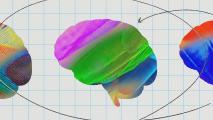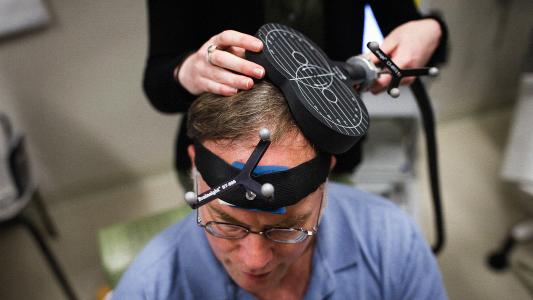An enormous study links intelligence and personality in surprising ways
Thousands of studies examine human personality and intelligence — core aspects of individuality — including how to measure them and how they impact life outcomes. But we know surprisingly little about how personality and intelligence relate to each another.
“Each study pressed a pinprick in the veil, offering an insight into what makes people unique,” Kevin Stanek, a human capital researcher at Gilead Sciences, explained to Big Think. “But we wanted the panoramic view. We wanted to know how it all fits together to make each person an individual.”
So Stanek, Deniz Ones, and dozens of research assistants set out on a massive quest to collect data from every study they could find, including research that was never published, research by the military and private businesses, and research that had sat dormant on hard drives for decades. “We couldn’t have done it without thousands of hours of help from other researchers and volunteers,” reflects Stanek.
Fourteen years later, the massive data catalog has dropped. It contains 79 personality traits and 97 cognitive abilities from 1,300 studies from over 50 countries including over 2 million participants. And an early meta-analysis published in the Proceedings of the National Academy of Sciences shows that personality and intelligence relate in some surprising ways.
What do we mean by personality and intelligence?
Personality and intelligence are largely genetic, stable traits that substantially influence the course of one’s life, from educational attainment and job performance to divorce rate and life expectancy. But what are they, exactly?
Personality describes how someone generally thinks, feels, and behaves. It is made up of five major independent traits, also known as the “Big 5”: neuroticism, extraversion, conscientiousness, openness, and agreeableness. Stanek and Ones’ dataset also incorporates several aspects and facets that make up each of the Big 5 traits, like depression and suspiciousness for neuroticism, and politeness and empathy for agreeableness.
Intelligence (termed cognitive ability by the researchers) describes how well someone can understand and apply information. Intelligence can be split into two kinds. Acquired knowledge, also called invested abilities, refers to specific skills and knowledge. Non-invested knowledge refers to all other cognitive abilities. Like personality, these two types of intelligence can be broken into facets like working memory, pattern recognition, and verbal ability.
“The links between these nuanced traits are what make us individuals,” explains Stanek. “They’re the richness of the picture beyond just personality types and IQ scores.”
How personality is related to intelligence
The disorganized and absentminded professor, the moody genius, the bubbly airhead — many stereotypes link certain personality traits to intelligence. Is any of this based in reality? Stanek and Ones’ initial meta-analysis of the compilation found hundreds of reliable relationships between personality and intelligence. (An interactive visualization is available here on Stanek’s website.) Here’s a sampling:
- Openness, which refers to the willingness to engage with new ideas and experiences, is the only personality trait with an established history linking it to intelligence. As expected, openness was moderately strongly correlated with general mental ability.
- Conscientiousness, a measure of self-regulation and orderliness, correlated positively with intelligence overall. But some facets, including cautiousness and routine seeking, predicted lower cognitive abilities.
- Extraversion, a measure of sociality and enthusiasm, was only negligibly related to intelligence overall. However, the activity facet more strongly correlated, and (surprisingly) sociability had a small negative relationship with some cognitive abilities.
- Neuroticism encompasses negative emotionality, which can inhibit advanced thinking. Despite the trope of the moody genius, perhaps it’s no surprise that higher levels of neuroticism predicted lower levels of intelligence, albeit weakly. The uneven temper and depression facets were particularly strong predictors of decreased intelligence.
- Agreeableness, which relates to getting along with others, overall had the weakest correlation with intelligence. However, the compassion and interpersonal sensitivity facets were moderately strong predictors of general mental ability, and the politeness facet was negatively associated with some cognitive abilities.
In short, the data showed at least two things. First, most of the significant correlations occur at the facet level rather than the Big 5 level. Ignoring these more specific traits conceals important relationships between personality and cognitive ability. “It’s convenient to categorize people into basic types,” Ones says. ”But only by incorporating the many nuances of personality do we see the constellation of traits that matter and make someone unique.”
Second, many of our stereotypes are wrong. Happy, engaged, compassionate people are more likely to be intelligent than their moody, insensitive counterparts.
What to expect when you’re extraverted
Ones cautions against any causal claims. These are after all just correlations, and it will take time for researchers to fully assess how clusters of personality traits and abilities move together. But one intriguing possibility is that certain personalities are more likely to engage in cognitively enriching activities. This would explain why openness (that is, interest in engaging with new ideas and experiences) and activeness (a facet of extraversion) were positively related to intelligence.
It’s also possible that intelligence makes life easier, thus reducing negative emotionality and freeing one up to be less cautious and more compassionate. Or some third factor could be at play, like wealth or health boosting cognitive abilities and facilitating certain personality types. (Stanek and Ones are releasing a book this fall that will detail their thoughts on how it all fits together.)
“One takeaway is simply these neat connections — empathetic people, happy people, open people tend to be more intelligent,” says Ones. “But it’s bigger than that.” Stanek and Ones set their sights on using this information to better understand why personality and cognitive abilities go together, and ultimately how this information can optimize people’s success.
“Right now, companies use information to understand and influence you,” Ones explains. “We want people to better understand themselves so they can identify their optimal job, friends, city, romantic partner, or anything else important to them.”
This article was reprinted with permission of Big Think, where it was originally published.






